“Blessed be the Lord, my Rock, who trains my hands for war, and my fingers for battle.” ~Psalm 144:1
“Mine eyes have seen the glory of the coming of the Lord; He is trampling out the vintage where the grapes of wrath are stored; He hath loosed the fateful lightening of His terrible swift sword; His truth is marching on… Glory! Glory! Hallelujah! Glory! Glory! Hallelujah! Glory! Glory! Hallelujah! His truth is marching on.” ~Battle Hymn of the Republic
During this month of celebrating our nation’s independence, I can’t help but ponder the words of the Battle Hymn of the Republic, by Julia Ward Howe. The anthem, not written during the Revolutionary War, but during the American Civil War of 1861-1865, is a call to arms and a cry for freedom for those still enslaved, regardless of race or creed. The author exhorts those who are willing, to fight for freedom, to the death if necessary, but without complacency as an option. Human beings…family, neighbors, loved ones…were being exploited, abused and enslaved for the gain of certain others who weren’t willing to change. Her heart cried out for an end to this abomination resulting in the penning of this sacred hymn. America was a nation split in two over an evil that was being tolerated, and it was time for that abhorrence to end.
In the years just prior to his presidency, in a speech during his bid for the U.S. Senate in 1858,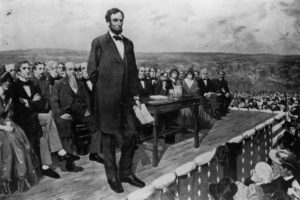 Abraham Lincoln quoted from Scripture, “A house divided against itself cannot stand.” In a modern biblical translation, the New Living Translation, it reads, “A kingdom divided by civil war will collapse; similarly, a family splintered by feuding will fall apart.” This was our country in the mid-nineteenth century; fast forward to modern times and this was my home-life for longer than I care to admit.
Abraham Lincoln quoted from Scripture, “A house divided against itself cannot stand.” In a modern biblical translation, the New Living Translation, it reads, “A kingdom divided by civil war will collapse; similarly, a family splintered by feuding will fall apart.” This was our country in the mid-nineteenth century; fast forward to modern times and this was my home-life for longer than I care to admit.
As a young bride, I wrongly believed my complete love and devotion could heal, even reverse, the wounds of the past that manifested in my then-husband. He’d had a difficult upbringing, for sure. But I believed with my whole heart that my love could, and would, stem the tide of his brokenness and set his life—our life together—on a steady course. Smooth sailing was to be had for those who believe that love conquers all.
But there were more than a few inherent problems with that line of thinking, the first being that of the two of us, I was the only one who believed it. As it was, I suppose that served to motivate me to try all the more. I was young and naïve but I would soon learn that one-way love is not a recipe for wedded bliss.
Problems two and three weren’t any small challenge either. I had married someone with an addiction who was also incapable of humility or returning love—a narcissist.
When I married in 1985 I didn’t even know what those things were, not by definition anyway, but I quickly learned their meaning by sharing life with a person who was plagued by these disorders. There is a lot of information available now on these topics, but not so much 40 years ago. Nor was access to information easy in those days. I’m not going to belabor the clinical aspects of these disorders with their deep, gnarly, life-choking roots, but I will share my experience in the hopes of dissuading others from following a similar path, or to encourage you if you are reading this and find yourself in need of hope.
 I unfortunately realized when I married at age 23 that like The Wizard of Oz’ Dorothy, I’d been “caught up in the cyclone.” That’s really the most concise way to describe the whirlwind that quickly became my life. You see, I came from a family of stability and my childhood was relatively uneventful in terms of trauma or chaos. My parents both held down steady jobs. Their work ethic was strong, and the first thing done with money from their paychecks was the paying of bills; there was a roof over my head, food on the table, and clothes on my back. Whatever was left-over after meeting financial obligations went toward other life necessities, and then, perhaps, a few “wants” on the side. My sisters and I had bicycles and games, toys and books, and if truth be told, we were probably the envy of the neighborhood.
I unfortunately realized when I married at age 23 that like The Wizard of Oz’ Dorothy, I’d been “caught up in the cyclone.” That’s really the most concise way to describe the whirlwind that quickly became my life. You see, I came from a family of stability and my childhood was relatively uneventful in terms of trauma or chaos. My parents both held down steady jobs. Their work ethic was strong, and the first thing done with money from their paychecks was the paying of bills; there was a roof over my head, food on the table, and clothes on my back. Whatever was left-over after meeting financial obligations went toward other life necessities, and then, perhaps, a few “wants” on the side. My sisters and I had bicycles and games, toys and books, and if truth be told, we were probably the envy of the neighborhood.
That neighborhood was filled with families of modest means, including mine. It was far from affluent, not even close, but we were blessed. Blessed with parents that worked hard, knew how to budget, and knew how to make the most of what they had. They were both children of the Great Depression and my life was blessed, in part, because of their knack for “making something out of nothing.” I think this is a long-winded way of saying my sisters and I were loved and cared for, our needs met, and we were blessed with a fair amount of extras, as well.
This is not to say my family was perfect because all families have some amount of challenging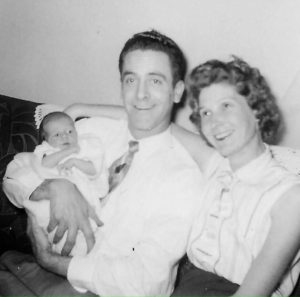 dynamics, but it is fair to say we were closer to The Cleaver’s than The Hatfield’s and McCoy’s. (Now that I think about it, there might have been a tad bit of Hatfield and McCoy thrown into the mix, or closer still, the occasional Beverly Hillbillies…but mostly Cleaver by the time it got to my generation). Anyway, families like my family of origin do not just happen out of thin air. The reason we benefitted was because the adults in the home were, in fact, adults. They lived responsible lives because first, it’s who they were, and second, because they understood what it meant to “train up a child in the way he should go” so that “when he is old he will not depart from it.” (Proverbs 22:6)
dynamics, but it is fair to say we were closer to The Cleaver’s than The Hatfield’s and McCoy’s. (Now that I think about it, there might have been a tad bit of Hatfield and McCoy thrown into the mix, or closer still, the occasional Beverly Hillbillies…but mostly Cleaver by the time it got to my generation). Anyway, families like my family of origin do not just happen out of thin air. The reason we benefitted was because the adults in the home were, in fact, adults. They lived responsible lives because first, it’s who they were, and second, because they understood what it meant to “train up a child in the way he should go” so that “when he is old he will not depart from it.” (Proverbs 22:6)
This is not the type of person I married.
The person I married was a great actor, an imposter if you will; someone who was imitating a mate.
During our courtship (which was long distance, by the way) he said and did all the right things. Because of the long distance nature of our early relationship, he could easily hide from me choices and actions of his that weren’t on the up and up. These included financial irresponsibility, alcohol and drug abuse, questionable worksite behavior and employment ethics, stealing, lying and anger issues…basically he lacked good moral fiber or character. To him, integrity was a foreign concept.
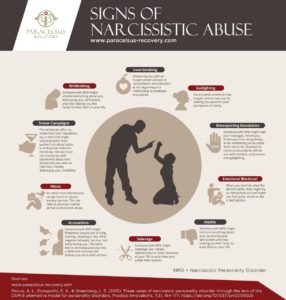 This was the reality that hit me square in the face shortly after the “I do’s” and the signing of the marriage certificate. I clearly remember moments after driving away on our honeymoon, he exhibited behavior that caused me to ask, “Who is this person?” I won’t go into detail except to say that’s how quickly he let down his guard and showed his true colors.
This was the reality that hit me square in the face shortly after the “I do’s” and the signing of the marriage certificate. I clearly remember moments after driving away on our honeymoon, he exhibited behavior that caused me to ask, “Who is this person?” I won’t go into detail except to say that’s how quickly he let down his guard and showed his true colors.
And I was ill-equipped to even begin to understand what had just happened, who I had committed my life to, or what lay ahead. Too embarrassed to reach out to family or friends, I suffered quietly, trying my best to undo or mitigate one catastrophe after another. In time, I learned to read the tell-tale signs of impending disaster so as to “head it off at the pass.” I know this is called enabling, and I was the queen of enablers, but I didn’t know that then. I’d never even heard of an enabler. All I wanted was the fairly normal life I was accustomed to. Besides, life already comes with its share of difficulties. But my new life seemed to have calamity hiding around every corner and behind every bush, lying in wait to attack without warning or chance for recourse, no sign of normalcy in sight. Such was the world I shared with an addicted narcissist and an imitation spouse.
For years, decades, I desperately tried to make my then-spouse happy and make our marriage work, seeking to gain his attention with good works, wanting his respect, aching to be loved. I wanted to scream “WHY DON’T YOU SEE ME?” I’m older now, but I wasn’t then. I was young and vibrant. But whatever beauty I held, inside or out, was not as attractive to him as the bottle. I used to lament other troubled marriages where the husband left for another woman, because at least that somewhat made sense, but my competition was an inanimate object, a bottle of whiskey, or the bar where it was served. Imagine my self-esteem…I wasn’t even as attractive as a bottle of booze.
I laid awake and alone many nights wondering when he would come home, knowing he’d be drunk but at least he’d be safe, instead of somewhere dead in a ditch (or God forbid, that he’d killed or harmed someone else.) There were other times I grew tired of waiting; I’d leave so as to be gone when he arrived, thinking maybe that would startle him and he’d have to worry about me for a change. Not a single one of those times did he even notice I was gone. I would eventually grow tired of the cold, dark night, and come back to find him passed out. The next day, not a word of recognition from him to indicate he suspected I’d been anywhere but home. I wanted to disappear again. I was living in a house divided, but I was too stubborn to let it fall, so I went above and beyond, mastering the art of rescue, not knowing it was the worst thing I could do.
Have you ever felt diminished? Have you ever really considered the meaning of it? Years ago, when I first stumbled across the word in an attempt to express what had become of me, diminished came to mind. Reduced, is another. I often wondered where I’d gone. “What happened to Tami?” I could no longer see her, she was so small. And the thing about being small is you can’t see over the muck and mire to find your way out. You know that “out there”, beyond prison walls both visible and invisible, you still exist—or at least you hope so because that’s all you have left to cling to. The tiny hope that you haven’t completely vanished.
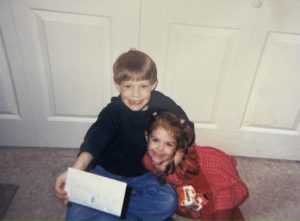 Well, time passed and after 11 years of “marriage”, the children came; a son first, then a daughter…three years apart. Things were slightly better for a short time, but only intermittently. The cycle of abuse (explosion, then honeymoon phase, tension building and ultimately explosion again) was alive and well, with the duration of the honeymoon phase growing ever shorter while the tension building phase took up the slack. It was a cycle I could predict in my sleep, or blindfolded…and I was weary. More importantly, I now had two young children who deserved a better life. Yes, we were an “intact” nuclear family. From the outside, it looked a little like those Cleaver’s I mentioned earlier. But the reality felt a little closer to The Shining. And I did not want to wait until the end of that story to escape with my children.
Well, time passed and after 11 years of “marriage”, the children came; a son first, then a daughter…three years apart. Things were slightly better for a short time, but only intermittently. The cycle of abuse (explosion, then honeymoon phase, tension building and ultimately explosion again) was alive and well, with the duration of the honeymoon phase growing ever shorter while the tension building phase took up the slack. It was a cycle I could predict in my sleep, or blindfolded…and I was weary. More importantly, I now had two young children who deserved a better life. Yes, we were an “intact” nuclear family. From the outside, it looked a little like those Cleaver’s I mentioned earlier. But the reality felt a little closer to The Shining. And I did not want to wait until the end of that story to escape with my children.
(End of part 1)
“I have read a fiery gospel writ in burning rows of steel. As Ye deal with my contemners, so with You my grace will deal. Let the Hero, born of woman, crush the serpent with His heel. His day is marching on…”
~ Battle Hymn of the Republic (third stanza)
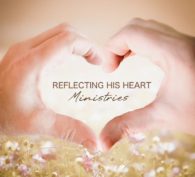

So beautifully written Tami! I love you!